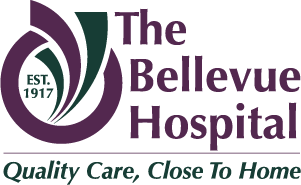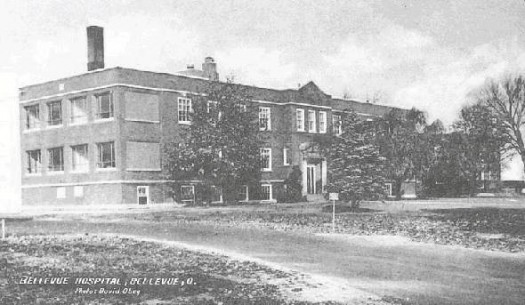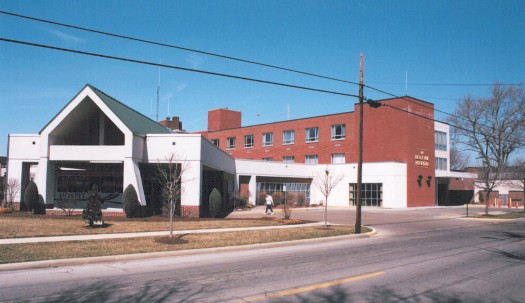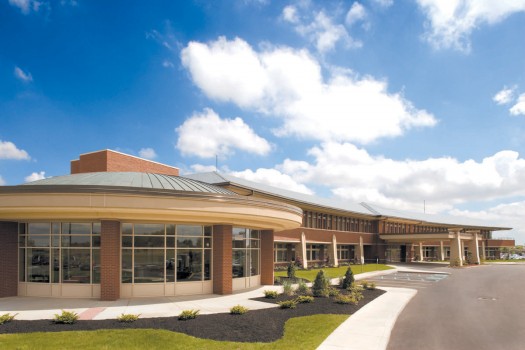The Bellevue Hospital has been serving the community since 1914.
In 1914 a group of Bellevue citizens looked to the future and envisioned a modern public hospital that would allow the people of the community to receive their medical care locally. On March 6, 1917, The Bellevue Hospital was dedicated.
Founded on the philosophy of providing contemporary medicine with hometown caring, the hospital continues the tradition today. The personal touch of Caring for our Community is a Bellevue Hospital trademark.
The original building had 24 beds and 9 bassinets for newborns. The hospital continued to grow and add space as the population increased and the hospital expanded health care services.
In 1953, and during the 1960s, the hospital's growth required additional patient beds, a surgical suite, laboratory, kitchen and boiler room.
The above picture of the hospital was taken in 1964. In 1964 the hospital had a staff of ten physicians and a staff of sixty-five employees. The hospital housed sixty hospital beds, eleven maternity bed and eleven bassinets. The hospital also operated a 20 bed nursing home, "Biebricher House" located at 426 West Main Street.
The 1970s was a decade of change for The Bellevue Hospital. In 1973, a six-bed Intensive Care Unit was specially equipped and staffed to meet the needs of the critically ill and injured. In 1976, the hospital adjusted to a declining birth-rate and closed the maternity ward. In 1978, The Bellevue Hospital became the first small and rural hospital in Ohio to begin an inpatient alcohol detoxification and rehabilitation program. Two physician buildings were also added during the late 1970s providing a convenient, centralized health care campus.
The 1980s were busy years for the hospital with the completion of two major building expansions, a third physician's building, and increased patient services. Some of the services added included a rural cancer program with a specialized outpatient oncology clinic; a Cardiac Rehabilitation Program for patients who have experienced a heart attack or had recent cardiac surgery; a swing-bed program offering the capability of short-term skilled or intermediate long-term care; a Family Birthing Center focusing on a home-like atmosphere; and an emergency ambulance program with transfer and invalid services available.
On February 21, 1993, The Bellevue Hospital dedicated its $3.7 million expansion and renovation construction projects. A new surgery addition includes three surgical suites, recovery room, minor surgery suite, conference room, Pre-Admission Testing room, emergency and surgery waiting room, remodeled chapel, main entrance and gift shop. The North addition houses the new six-bed Intensive/Coronary Care Unit, Physical Therapy, Materials Management, and Nuclear Medicine Departments.
In 1994, the hospital once again recognized an opportunity to serve the needs of the community by opening a Senior Treatment Enrichment Program (STEP). The STEP unit provides outpatient treatment for a senior population with depression or emotional difficulties.
In the summer of 1995, the hospital installed a magnetic resonance imaging (MRI) scanning system, the latest and most exciting technology in the world of diagnostic imaging. This new capability will allow the hospital to provide area residents and their physicians daily access to some of the most advanced techniques yet developed for peering into the human body.
Construction was once again a familiar site on the hospital's campus during 1995. The hospital's new dining room construction added more than 2,000 square feet to the southwest side of the hospital and provides a pleasant, roomy atmosphere for enjoying a meal. The kitchen facilities also were renovated, adding a new grill, stove, refrigerator/freezer and air conditioning.
From 1995 until the present, The Bellevue Hospital continued to update its services, equipment, and building. Improved services include the Breast Care Program, using a less invasive, stereotactic breast biopsy procedure; the expansion of the STEP program into Health Counseling Services, offering private counseling to area adults; our Clyde Clinic began offering primary health care services; an Occupational Health Center was opened to serve our business and industry customers; an emergency telephone call system began; and a new Sleep Disorders Lab was added. Equipment included the addition of a high-speed CT Scanner; an OPEN MRI Unit; and surgical equipment to perform the latest in laser and other less-invasive types of surgeries. Our building was updated by the conversion of semi-private rooms into six new private rooms on the Med/Surg Unit, and one of The Bellevue Hospital Foundation’s community service projects resulted in the addition of a new visitor elevator near the main lobby waiting room area.
As our services and programs grew, it became more apparent that our facility might be less than adequate for our next century of caring. The hospital and its board of trustees began an in-depth two-year study to determine how to adequately serve the needs of our growing communities, concluding with the decision to build a new hospital. This visionary leadership helped to assure our continued tradition of caring, and the new hospital accepted its first patients on March 13, 2005.
The exterior of our prairie-style, 129,000 square foot facility located on 109 acres blends with the gentle slopes of the surrounding Northern Ohio farmland. Our building encompasses new equipment, programs and services. Equipment such as MRI and CT scanners offers a higher quality and faster imaging; our newer 3D MAMMOMAT mammography machine offers wide-angle imaging for better breast cancer detection and our two new da Vinci Xi Surgical Systems allows TBH to offer minimally invasive robotic-assisted surgeries. Programs including Occupational Health offer additional space and a convenient location; and expansion of services in our Specialty Care Clinic now has full-time cardiology services and at many other medical specialists. The Bellevue Hospital is the first hospital in the U.S. to become an Anytime Fitness franchisee, offering our community another way to keep their health and wellness a priority. TBH is also home to a variety of specialties including pain management, wound care, inpatient and outpatient rehabilitation services and aquatic therapy, infusion and cancer care services, and vein treatment.
In 2007, we celebrated our 90th year of providing Quality Care, Close to Home by continuing to offer new healthcare services, more physicians, and great care by professionals who care for patients as members of our family. During the year, the hospital’s Foundation began building a Meditation and Walking Trail between the hospital and US 20. The hospital’s Board of Trustees also approved our former building to be torn down and converted to green space. The three medical buildings will remain at the Northwest Street location.
The Bellevue Hospital was named one of the Top 100 Places to Work in Healthcare for 2008 by Modern Healthcare Magazine. The hospital also scored in the top 5% nationally on Hospital Consumer Assessment of Healthcare Providers (HCAHPS) by Press Ganey; and TBH’s Home Health Agency ranked in the top 25% nationally by HomeCare Elite.
In 2017, TBH celebrated our 100th anniversary and filled the year with a variety of events, community outreach programs and expanded services. Over the last several years, TBH has been honored to win several awards including the Women's Choice Award in Emergency Care in 2021, 2022 and 2023; the Women's Choice Award in Patient Safety in 2019 and 2021, and the GoClear Award for its achievement in eliminating hazardous smoke from its surgical procedures in 2022. The Bellevue Hospital now has over 400 employees and has over 100 physicians on our combined active and courtesy medical staffs.
While healthcare and the world has changed over the last few years due to the COVID-19 pandemic, one thing has remained the same - The Bellevue Hospital's committment to provide Quality Care, Close to Home.



